| |
"People use this awful phrase 'Renaissance Man', when... ...I think it’s a rather philistine way to describe a man who simply has a range of interests. I was brought up by parents who thought that sort of thing was perfectly natural." |
| |
Director Jonathan Miller interviewed in 2003* |
The estimable Jonathan Miller (who prefers his knighthood's 'Sir' socially omitted) is perhaps best known as a theatre director, famous for being trained as a neurologist in the 50s and then suddenly diverting his career into comedy. As you do. Beyond The Fringe was the landmark project that made his name together with co-writers/performers Alan Bennett, Peter Cook and Dudley Moore. He went on to produce television arts programmes and helm huge stage productions, both plays and operas. So a significant percentage of his vast creative output remains in the memories of those lucky enough to have seen these productions. Miller is best appreciated at Outsider for his superlative BBC Omnibus drama, a singular adaptation of M. R. James' ghost story, Whistle and I'll Come To You and his BBC 4 series A Brief History of Disbelief. He remains an atheistic, rational left wing polymath with no love of Thatcher or Blair and profoundly involved with art of all kinds. So it came as something of a surprise to learn that he had directed just the one movie, based on a book published a decade before the film appeared. I mention this because the book feels like a pre-sixties take on British society but interpreted through a late sixties lens. Its subject and treatment seem a little distant from Miller's other screen work (perhaps this is the point) and the novel is adapted by one of the most flamboyant and approachable artists of the twentieth century, jazz musician George Melly. He was in a fine mood when I interrupted his lunch at BBC Broadcasting House in the early 80s to get an autograph for a friend's birthday.
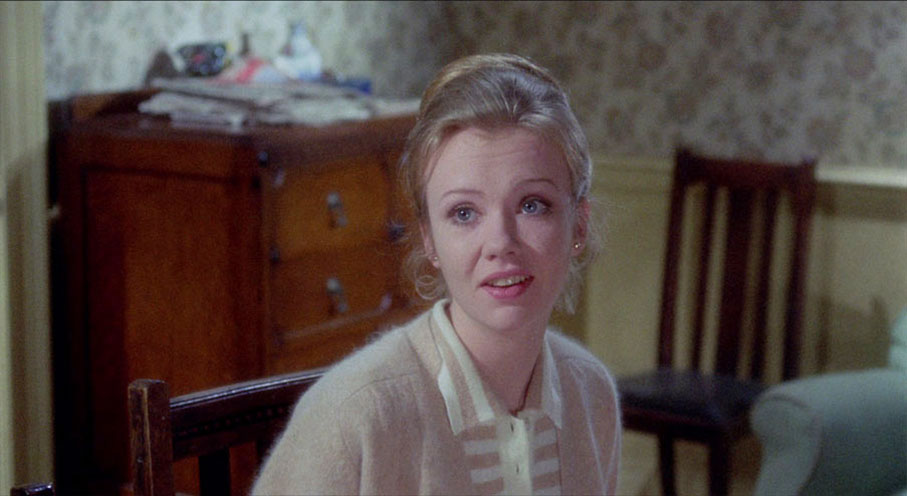
Take A Girl Like You is the story of Jenny Bunn (yes, OK but don't blame me. 'Buns' is after all an Americanism) and her venturing south of England from her home in the North to claim a teacher's job in the turbulent sixties. Almost before her coat comes off, another teacher Patrick Standish, who is anything but standoffish, courts her relentlessly. I had originally written 'stalks her relentlessly' because that's what it feels like from a twenty-first century perspective. Over a series of weeks and months, Jenny comes into unwelcome contact with both her own landlord and landlady and stakes a claim as a virgin in social waters teeming with would-be predators. She believes that a first full sexual encounter should be reserved for her wedding night. I believe this to be one of the most pernicious and poisonous ideas ever perpetuated in human culture. I can't nail its specific origin but Victorian values based on religious rules are probably at the heart of it. Don't misunderstand me. I'm not saying Jenny is an idiot (you are as you are raised) but I am suggesting that it's a good and necessary idea to get to know someone, someone you are committing your life to, well enough to know if you are both sexually compatible. In the Victorian era, sex education was non-existent and young men and women went ignorantly through both puberty (think how scared Carrie was in the shower as all girls would be without education) and a wedding night on which the uninformed had no clue what they were supposed to be doing. I mean they could wing it, I suppose. It seemed to work. I mean you're reading this and I'm writing it so someone must have figured out what goes where back in the Victorian era. And the planet is not exactly bereft of human beings... So now in a ridiculous and not wholly serious reversal, maybe it's a good idea to reintroduce the practise. After all, there are way too many of us on the planet today...
Jenny's relationship with Patrick is frequently stalled by her own insistent morality and while they never seem like a potential fit, they persevere but Jenny stays resolute with one chink in her moral armour eventually undone by careless talk. Jenny is played by Hollywood's and specifically Disney's virginal child actress Hayley Mills, a canny piece of casting to be sure. Here is a radiant beauty that the audience assumes is still somewhat unpractised in erotic experience. Mills was twenty-four (going on sixteen if you went by looks alone) during filming so this is a rather silly assumption but nonetheless it's her strength of character that emerges, one from such an unlikely source if we are flirting with the sexual stereotypes of the day. Fulfilling (or even over-fulfilling) his role as the frustrated predatory male is an actor of such raw power and dark charisma that I feared for Jenny's life at certain points in the narrative. Oliver Reed could darken the act of kitten-stroking. While he is perfect as the bawdy and doomed priest in The Devils and the lustful Gerald in Women In Love, it's hard for me to see Reed as an ordinary man, a graphics teacher no less, so inflated was his own persona in his own lifetime. That's my baggage and for that load I apologise. The fact he is terrifying in this role is more to do with modern context than historical acting. I fail countless times to see his 'courtship' as normal though I admit Reed's dark attractiveness can work on many, my own wife included. But I never got the impression that Mills was completely comfortable with him. But the screen burns brightly with him eclipsing everyone else in the frame although Penelope Keith ('Margot' from The Good Life) gives him some competition. Note to self; this is only because it's Margot Leadbetter...
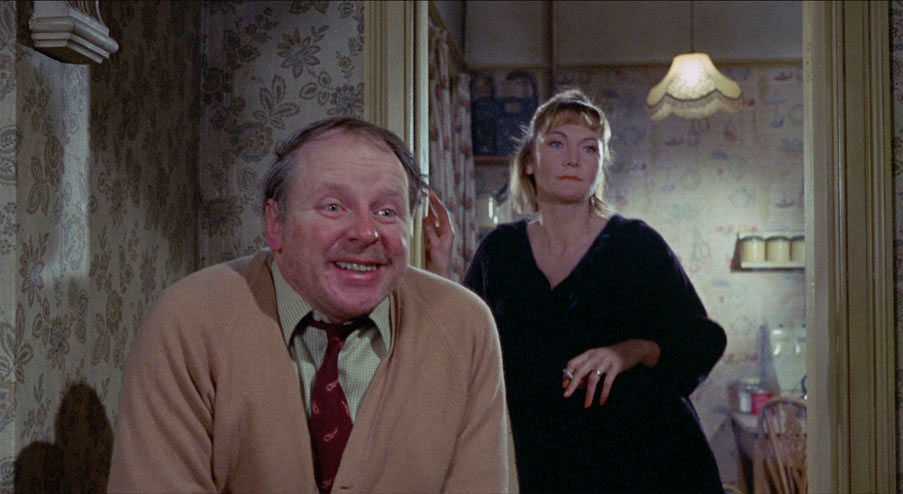
Around the edges of this primary relationship are the other supporting characters all played by very well known British actors of the time. It's no great shock to see Penelope Keith playing a Conservative volunteer taking an exit poll while John Bird (forever the Vice-Chancellor and source of a virulent sexually transmitted disease at Lowlands University in the sublime A Very Peculiar Practice) is an ill-looking drunk councillor who makes clumsy passes that today would have him serving a few years at the pleasure of Her Majesty, a phrase I still find uniquely troubling. It's a nice coincidence that his future comedy partner John Fortune is also in the film as an airport spokesman in televisual debate with Bird. His angry and dissatisfied wife Martha is finely tuned as the angry and unfulfilled wife played by Sheila Hancock, an actress still impressing us with her quick wit on BBC Radio 4's Just A Minute in her eighties currently having debuted on the programme at the age of twenty-one. I must give a nod to the show's host Nicholas Parsons who's 95 and still working with nuanced alacrity. Wow. Aimi McDonald's somewhat shallow Wendy is a very recognisable face often playing the sexy sidekick in TV roles while Ronald Lacey, the less attractive of the men in this particular social world, looks extraordinary at the age of thirty-five. He looks all of eighteen. This is probably because I'm so used to his older roles (well, not that much older. He died at fifty-five). Blink and you'll miss Doctor Who's Brigadier Lethbridge-Stewart, Nicholas Courtney and The Liver Birds' Nerys Hughes. Reed's competition is Noel Harrison (Rex's son) as Julian, the rich man who seems to be devoting his life to pleasure wherever he can find it. The acting, on the whole is of a very high standard but barely a scene goes by when Hayley Mills isn't pawed or inappropriately manhandled. It's suffocating.
However, there are many incidental pleasures to enjoy along the way despite the contextual bad taste in the mouth many moments deliver. This brings to mind a food metaphor. My family was offered cheese last night that everyone agreed tasted of plastic fish. It's not an apt metaphor by any means but the behaviour in Take A Girl Like You is forever, like that cheese, pulling you up short. First off, this is a Hal Chester production, he of The Night of the Demon infamy. There's a 'falling in love' montage – all mixes and soft focus because of the second generation quality of film dissolves – that doesn't quite work for all the effort of the accompanying pop song ("You're the only one I got to love somehow...") and Mills' attempting to make walking on ground at a thirty degree angle seem effortless while being so much in love. Reed is less comfortable as a smitten character. He fondles sheep (is that a metaphor?) and he is clearly someone just scheming for (what he thinks is) the eventual horizontal reward. There's a kind of brutal honesty to his character ("Jenny, no one believes in virginity anymore...") but it's hard to find that as a virtue. It's more of the structure of seduction. Watching him, you feel that the moment he gets her into bed, then the game is over. In a rush in his Morris Minor, Reed has the first of his two cinematic train level crossing scenes. In this one he's burning with frustration stuck in his car. In Women in Love, he's brutalising his horse, drawing its blood and beating it as it shies from a speeding train. Just after the shot of the man petulantly holding a temporary 'Stop' sign to impede his journey, there is a glorious shot of three workmen sitting down with an arrow pointing to all three posing as the famous monkeys, the first with his hands over his mouth, the second over his eyes and the third over his ears. A real world Japanese iconic quotation with disputed origins from Jonathan Miller. Did we expect anything less? Reed's crashing into a huge puddle as a sexual metaphor is less awkward than the constant train impeding Reed's journey. At least there are no tunnels for the train to disappear into. Reed's feckless rival says about carnal pleasure, "Sex is like a game... A game in which no one has to say 'No.' Just 'Yes!'" Jesus, that's a statement that has not time-travelled well. For reasons beyond my comprehension, Hayley Mills makes cocoa accompanied by an extraordinarily inappropriate, strings-led twenty-seven second music cue. Yes, she looks vulnerable in her blue towelling dressing gown but what was composer Stanley Myer's score actually conveying there? Jonathan Miller himself slips in a cameo almost walking in to Reed as he stalks off again frustrated with the direction his relationship with Jenny is going. And was that taxi driver at the start really an uncredited Dad's Army alumnus, Edward Sinclair as Walmington-on-Sea's obsequious verger?
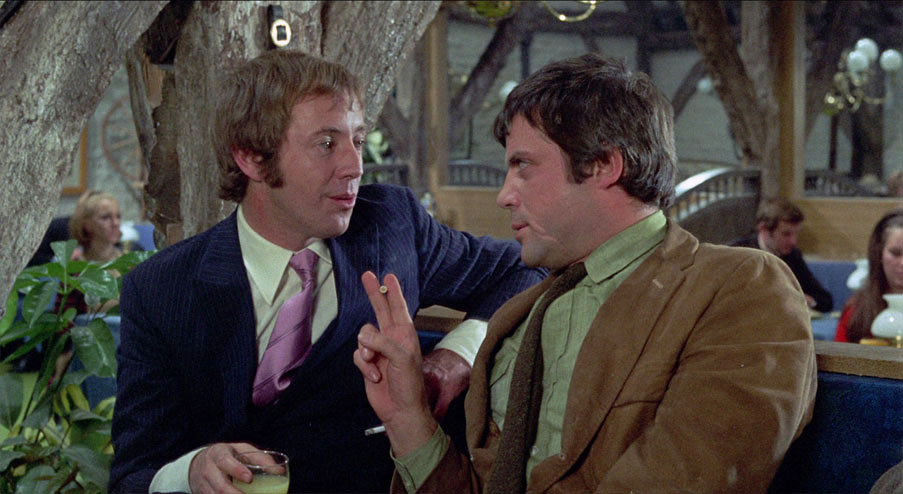
Take A Girl Like You is stuck in the sixties but as a cross-section of what society has evolved from, it is illuminating, really well performed, entertaining and not without considerable merit in certain scenes. I would have preferred less of what was 'normal' then but I understand why it was depicted that way. Reed is darkly mesmeric while Mills is his flipside, the blonde beauty that feels pressured and betrayed by the whole male race. Believe it or not, the crass tagline of the film on the poster was "In this day and age, what's a virgin to do?" I'll let that one stew for a moment before we gallop to the extra features. One last and silly thing but for a movie about men and women, Miller could not have found a cinematographer with a more relevant name... Dick Bush... Could you make that up? A technician named Penis Vagina may not have secured the job...
Presented in a 1.85:1 format with narrow letterboxing top and bottom to preserve its correct aspect ratio, the film looks terrific with a fine, consistent 35mm film grain. The colours are presented naturalistically and the contrast levels are excellently judged. There are very few night scenes to test the blacks but they stand up perfectly well with some detail not crushed out.
The PCM original Mono soundtrack is surprisingly robust for a film of this forty-nine year old vintage and the music is rich and nuanced in a way unexpected for recording techniques of the day. Shepperton technicians really knew their stuff.
There are new and improved English subtitles for the deaf and hard-of-hearing.
A New Era Revisited: Interview with Hayley Mills (2019): the award-winning actor recalls her work on the film in this new and exclusive interview (13' 57")
Hayley Mills, the twinkle in her eyes still shining forty-nine years on, gives us her memories of the film making process. Unsurprisingly director Miller would give actors their head so to speak. What a surprise that Oliver Reed was effortlessly charismatic and owned a room he walked into. Apparently he could also pick up the front of a Mini – as Hayley says, "That's strong." She gives us more stories about Hal Chester's pocketing the props he felt he had paid for. It's enormously wonderful to have Hayley name check #Metoo – thank God for some perspective. She acknowledges and agrees with the criticism of virginity before marriage – thank you Hayley. She finishes with "I'm rather proud of it!" OK!
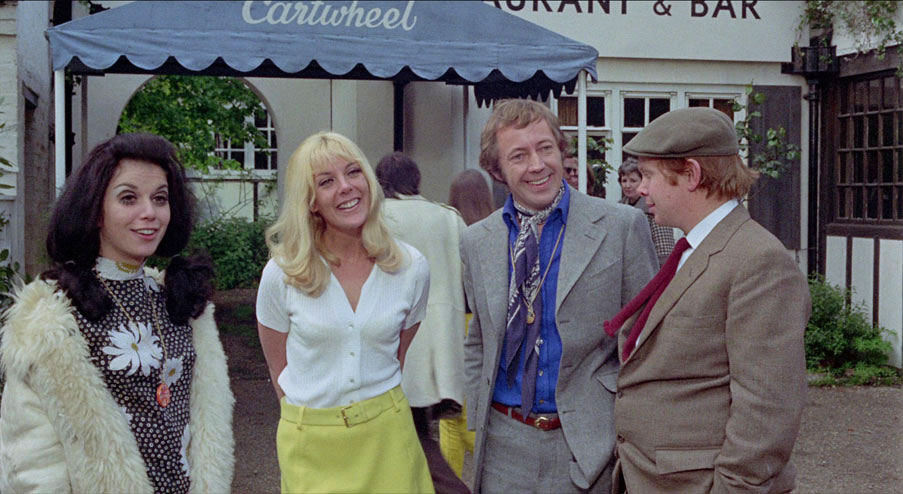
Now and Then: Jonathan Miller (1967): an archival interview with the author, academic and filmmaker in conversation with Bernard Braden (41' 22")
Oh, the smoking! This is a rescanned HD copy of what I believe is from a four reel 16mm source. The hairs in the gate, top and bottom, are evidence of the film medium. Miller muses on censorship (the morality of society's administrators). His views on child molestation would have had him Twitter-roasted and his ideas on Bonnie and Clyde are fascinating... "the pictures of what it suggests about psychopathic life..." Am fairly sure about the 16mm origin as the film runs out about 10 minutes and 40 seconds and after every such period in the running time. Someone has then checked and cleaned the gate, the framed area where hairs often used to lodge themselves. Miller reacts to the word 'fuck' pronounced in the broadcast public sphere for the first time. He ruminates on Braden's intelligent questions very adroitly as one would expect. He touches on the central idea of Minority Report, imprisonment before a crime is committed. Preventative restraint, that's a difficult subject. This is a fascinating forty minutes, shot three years before the movie he went on to direct.
Make A Film Like You: Production Manager Denis Johnson Jnr. And Assistant Director Joe Marks on Take A Girl Like You (2' 13")
Was producer Hal. E. Chester mafia? He has been reported as being something of a skinflint. He's also reported as something of a paranoid believing his English crews were taking him for a ride. There's a lovely black and white photo of the two principals, Chester and Miller. Miller was also a newbie and required some technical help on the shooting. Nice to hear there was an historical divide between the BBC and the freelance 'people'. Also it's nice to know that Reed stayed sober on the shoot but then took to the bottle soon after.
Isolated music & effects track
OK. Yeah. So? Who would want to listen to this and get anything from it except a history lesson on why these tracks were internationally necessary? Is it worth me commenting on these M&Es any more? No, I thought not.
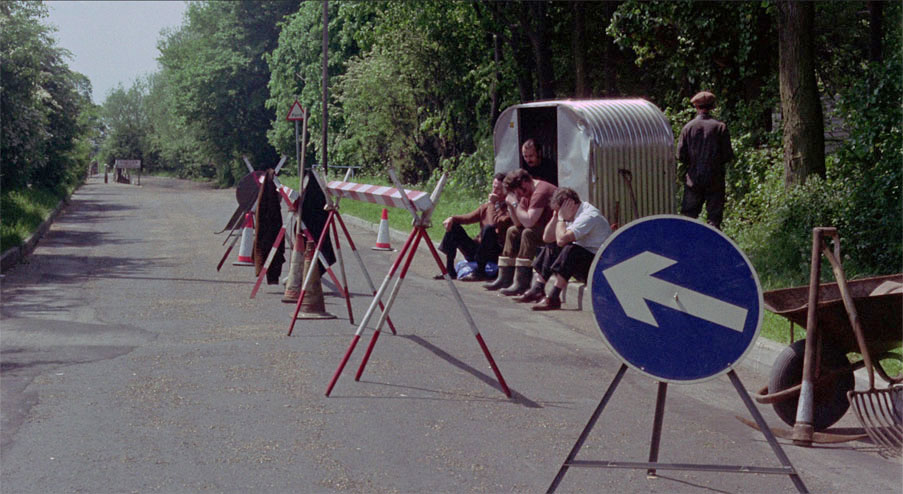
Theatrical trailers (2' 42" / 2' 25")
(1) "Her honour is as impregnable as Fort Knox..." Oh dear. The virgin angle is played up here as if that was a titillating aspect all on its own. The crass tagline gets two outings and the whole is presented as a fast cut sex drama. Oh, and if you've seen the film, (ironically) the trailer is full of spoilers.
(2) "When a mod young man courts an old fashioned girl, does he play by his rules or hers?" Jesus, again with the threat of rape bullshit! This is essentially the same trailer with a different voice over and it's all crass. As Reed forces a kiss on Mills prompts the voiceover "The direct manly approach. It's bound to work. Or is it?" We have come quite a long way I'm happy to report.
Image gallery: on-set and promotional photography
12 x B&W stills, 2 x Colour, 3 x Front of House stills and 3 x poster designs.
Limited edition exclusive booklet with a new essay by Melanie Williams, an overview of contemporary critical responses, archival articles, and film credits
Another winner from Indicator. Melanie Williams' essay, at the very start, makes the significant point of the novel's date of publication and the film's eventual release which makes it seem like I just pickpocketed the idea from her article. Not so. I got the booklet after I'd wrapped the review. But Williams manages to dive much deeper and much more satisfyingly into the subject. The accompanying photo is hard to make out. A smiling Mills surrounded by two people both bent over – is this a behind the scenes shot which just happens to look somewhat menacing? This film has that effect on me. The rest of the research on the film is very satisfying to know (Miller and Melly were painted into a creative corner by a well intentioned but – critically – a differently intentioned producer and the director did not have final cut). Take An Author Like Him is a piece on Kingsley Amis with no apparent byline and I learned a lot from this as I'm more familiar with his son's work. It's a collection of well-sieved quotes from the man and his work. Again, producer Hal E. Chester does not fare well in the famous author's estimation. The critical response was somewhat tepid, with a few nasty barbs, some wholly undeserved. All in all, the booklet provides a great deal of background on a fascinating film of its time.
Take A Girl Like Me is a living capsule of history, a well told but heavily dated story of men and women trapped within a society broadcasting wildly different messages to both sexes. It's entertaining and relevant to historians who need to unearth how extraordinarily awfully we treated each other in this era of so called new enlightenment. Base desires are not hidden well and romantic subtlety is something for non-macho types. It's not a film to learn from in terms of our current behaviour but definitely one to watch to see from where we came. Recommended with a few caveats!
|